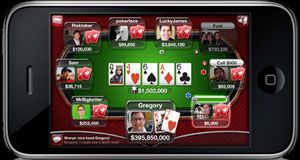For poker enthusiasts, the age-old debate of online poker vs. live poker is a common topic of discussion. Each format offers its own unique advantages and disadvantages, catering to different player preferences and skill levels. In this article, we will explore the pros and cons of both online poker and live poker, allowing you to make an informed choice about which variant suits you best.
Online Poker
Pros:
Convenience: One of the significant advantages of online poker is the convenience it offers. Players can access their favorite poker games from the comfort of their homes, eliminating the need for travel to a physical casino. This convenience allows players to fit poker sessions into their busy schedules effortlessly.
Availability: Online poker rooms are open 24/7, allowing players to jump into a game whenever they desire. There is an extensive range of poker formats and stakes available online, catering to players of all skill levels.
Speed and Multi-Tabling: Online poker is much faster compared to its live counterpart. The automated dealing of cards results in quicker gameplay, enabling players to play more hands per hour. Additionally, online poker allows players to multi-table, meaning they can participate in multiple games simultaneously, maximizing their potential for profits.
Lower Stakes: Online poker rooms generally offer lower stakes compared to live casinos. This is advantageous for beginners or players with smaller bankrolls, as they can gain experience and develop their skills without risking substantial amounts of money.
Cons:
Lack of Physical Interaction: Online poker lacks the face-to-face interaction that live poker provides. The absence of personal interactions can make it challenging to read opponents and pick up on crucial tells, an essential skill in live poker.
Potential for Cheating: Online poker opens up the possibility for cheating through collusion, bots, or other unethical practices. While reputable online poker sites take stringent measures to prevent such activities, the risk is still present.
Technical Glitches: Internet connections can be unreliable at times, potentially resulting in disconnections or lag during crucial moments of the game. Such technical glitches can be frustrating and lead to an unfair disadvantage.
Less Social Interaction: Unlike live poker, online poker does not allow for face-to-face socialization with fellow players. The lack of social interaction can detract from the overall poker experience for some players.
Live Poker
Pros:
Physical Interaction: Live poker provides the opportunity for direct interaction with other players, adding a social element to the game. Facial expressions, body language, and table talk become crucial factors in reading opponents and gaining a strategic advantage.
Atmosphere: The atmosphere of a live poker game is unparalleled. The sights and sounds of a bustling casino, the clinking of chips, and the energy in the room create an electrifying ambiance that cannot be replicated online.
Enhanced Focus: In a live poker game, players are fully immersed in the moment, concentrating solely on the game and their opponents. This heightened focus can lead to better decision-making and a deeper understanding of the game.
No Technical Issues: Unlike online poker, live poker is not susceptible to internet connectivity problems or server issues. This eliminates the frustration of disconnections or lag, ensuring a smooth and uninterrupted gaming experience.
Cons:
Travel and Costs: Playing live poker requires traveling to a physical casino, which can be inconvenient and costly, especially for players who do not have a casino nearby. Additionally, live poker generally has higher stakes, limiting its accessibility for players with smaller bankrolls.
Slower Pace: Live poker tends to have a slower pace due to the manual shuffling and dealing of cards. This can result in fewer hands played per hour and potentially lead to periods of boredom or inactivity.
Tougher Competition: Live poker games attract seasoned professionals and serious amateurs, making the competition significantly tougher compared to online poker. This can pose a challenge for beginners who are still developing their skills.
Time Constraints: Live poker games often have scheduled start times and limited playing hours, which may not align with the availability and schedules of all players.
Conclusion
Ultimately, the choice between online poker and live poker depends on your personal preferences, priorities, and circumstances. Online poker offers convenience, lower stakes, and the ability to multi-table, whereas live poker provides physical interaction, an electrifying atmosphere, and enhanced focus. Consider the pros and cons of each format before deciding which variant suits your playing style and goals. Additionally, many players find joy in combining both online and live poker, capitalizing on the strengths of each format and enjoying a well-rounded poker experience.

